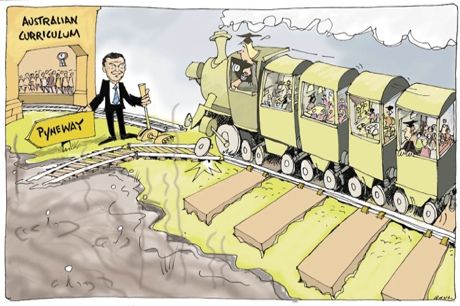Talking point
How much is too much government intervention in the curriculum?
Democracy not dictatorship
Penny Waring, Social Sciences Teacher, St Rita’s College, Clayfield, Brisbane
There are two key issues here: bias and practicality. Firstly, school curricula should be about a broad and balanced education that provides students with relevant knowledge and skills for adult life. This means giving access to a range of viewpoints and critical skills (not just those that are in favour with whoever is governing at the time).
Surely what is not in the best interests of students is to constantly move the goalposts regarding the nature of these skills and understandings at the whim of the government. After all, we live in a liberal democracy, not a dictatorship.
Secondly, how does the Government plan to resource schools in implementing yet another round of curriculum changes in time for the Minister’s proposed 2015 deadline? The recently announced review is likely to be highly disruptive, so we have to ask, ‘Is it in the best interests of the students?’
Let’s get on with the job
Lucy D’Angelo, Deputy Principal, Penola Catholic College, Victoria
The vision for developing a national curriculum has been in the pipeline for decades, with much time and energy being invested on a number of occasions, without a result.
Now that we are on the verge of full implementation from Years F-10, it is not helpful to be casting doubts about the validity and future of the Australian Curriculum, or AusVELS, as it is known in Victoria. Although the road has been much longer and more challenging than expected, we cannot be dismissing it at this point in time. Many teachers and educational leaders see the merit in establishing an Australian Curriculum framework which contributes toward defining what we stand for and value as a nation.
At the outset, there was much excitement about the numerous opportunities that a national curriculum could bring for students and teachers across the nation, with the intention of culminating in an Australian Certificate of Education. The task has been definitely ambitious and many compromises have been reached along the journey. Of course, the final product is not perfect, but it is now time to see the project through and evaluate it once we have had full implementation for a few years.
There is no doubt that government intervention is essential and cannot be avoided in education. Without government intervention, this enormous, collaborative project would not have made it this far. However, now that we have reached this point, the intervention we need is in supporting the implementation of the original goal: to deliver a world class education for all Australian children, as articulated in the Melbourne Declaration. Let us get on with the job of full implementation and do what teachers do best: inspire and nurture the development of the children and young adults in our care. Let us not get caught up in undermining each other and our profession.
No problems here
Larry Grumley English Coordinator and Auden tragic, Catherine McAuley Westmead, Sydney
Why would we not want government bureaucracy to dictate educational goals and strategies? What could possibly go wrong?
I explain to many students that my class is a benevolent dictatorship at best and totalitarian regime at worst – and that I am a mere puppet to the vagaries of the winds that blow across the face of the syllabi and the marking done by the state. I already have set times, set texts, set syllabi and an array of tests and statistics to let me know exactly what I have and haven’t done in a classroom. What could possibly be a problem?
A CTV is not needed in my room as every measure of my class and my performance within that class is taken by the numbers generated by the myriad of tests done on at school, system or state level. All of these are dictated – as a classroom teacher I have no chance to alter the administering of these signifiers of my students. But spring is mischief in me and I wonder why we meet to build this fence – sorry, I meant bridge. Surely the wise and powerful know what they are doing and I have yet to comprehend the basic idea that people are beings that can be quantified and categorised. Tyrell was right and the dove probably died of acid rain and pollution!
We have to remember the Prussian idea of schooling and the key was regimentation for a workforce – doesn’t every employer want to know you can work within the system they set? Isn’t every musician yearning to imagine a chord already known? Every writer looks to government for inspiration and pines to know what the quality of their work is?
Are we free? Are we happy? The questions are absurd:
If anything were wrong, we should certainly have heard.








































































































































